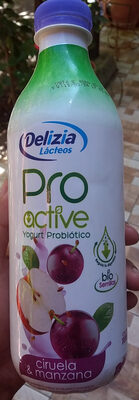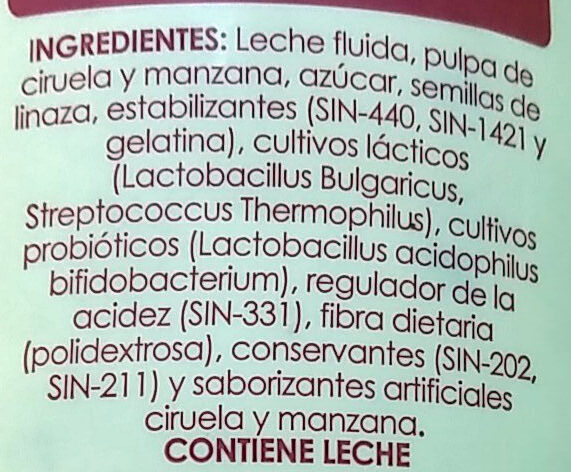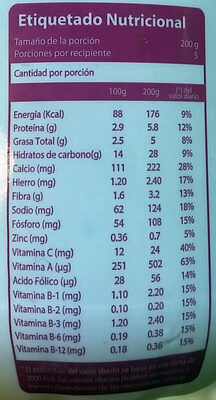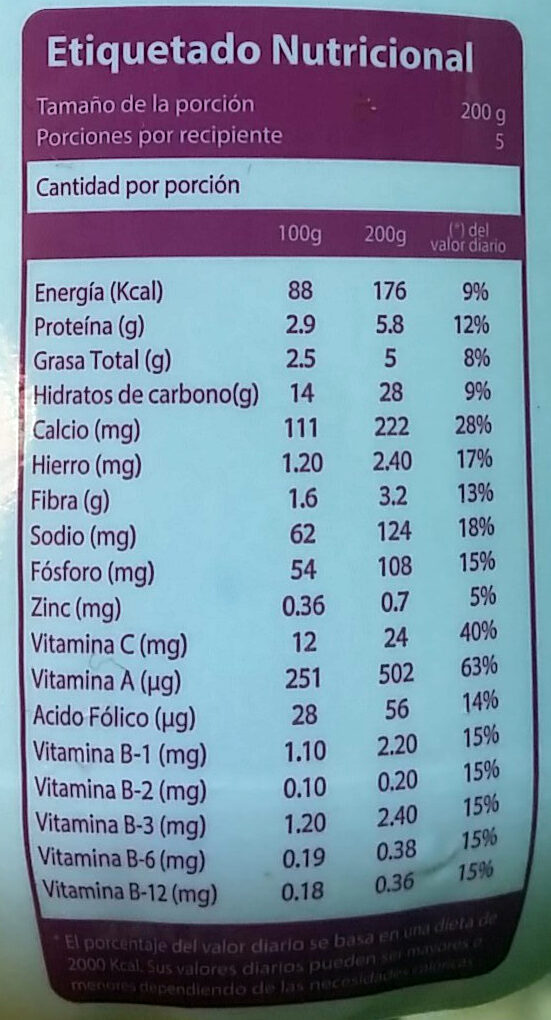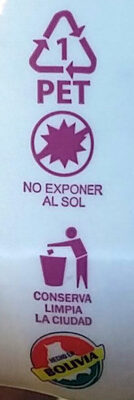Help us make food transparency the norm!
As a non-profit organization, we depend on your donations to continue informing consumers around the world about what they eat.
The food revolution starts with you!
Proactive Yogurt Probiótico Ciruela & Manzana - Delizia - 1000 g
Proactive Yogurt Probiótico Ciruela & Manzana - Delizia - 1000 g
Barcode: 7771224004008 (EAN / EAN-13)
Common name: yogurt probiótico con pulpa de ciruela y manzana sabor a ciruela y manzana.
Quantity: 1000 g
Packaging: Plastic, Pe-polyethylene, Hdpe-high-density-polyethylene, Bottle
Brands: Delizia, Proactive +, Delizia Lácteos
Categories: Beverages, Dairies, Fermented foods, Fermented milk products, Desserts, Dairy desserts, Dairy drinks, Fermented dairy desserts, Fermented dairy desserts with fruits, Fermented drinks, Yogurts, Fermented milk drinks, Fruit yogurts, Refrigerated foods, Flavoured fermented dairy desserts, Apple yogurts, Bifidus yogurts, Cow milk yogurts, Drinkable yogurts, Flavoured bifidus yogurts, Flavoured yogurts, Fruit bifidus yogurts, Plum yogurts, Yogurt with fruits and sugar, Yogurts with fruits and sugar, fr:Yaourts multifruits
Labels, certifications, awards: es:Hecho en Bolivia
Origin of ingredients: Bolivia
Manufacturing or processing places: El Alto, La Paz, Cotoca, Santa Cruz, Bolivia
Traceability code: 040103190001, 080103030003
Link to the product page on the official site of the producer: https://delizia.bo/product/yogurt-proact...
Stores: Delizia
Countries where sold: Bolivia
Matching with your preferences
Health
Ingredients
-
25 ingredients
Spanish: Leche fluida, pulpa de ciruela, pulpa de manzana, azúcar, semillas de linaza, estabilizantes (SIN-440, SIN-1421, gelatina), cultivos lácticos (Lactobacillus Bulgaricus, Streptococcus Thermophilus), cultivos probióticos (Lactobacillus acidophilus, bifidobacterium), regulador de la acidez (SIN-331), fibra dietaria (polidextrosa), conservantes (SIN-202, SIN-211), saborizante artificiales (ciruela, manzana).Allergens: Milk
Food processing
-
Ultra processed foods
Elements that indicate the product is in the 4 - Ultra processed food and drink products group:
- Additive: E428 - Gelatine
- Additive: E440 - Pectins
- Ingredient: Flavouring
Food products are classified into 4 groups according to their degree of processing:
- Unprocessed or minimally processed foods
- Processed culinary ingredients
- Processed foods
- Ultra processed foods
The determination of the group is based on the category of the product and on the ingredients it contains.
Additives
-
E1200 - Polydextrose
Polydextrose: Polydextrose is a synthetic polymer of glucose. It is a food ingredient classified as soluble fiber by the U.S. Food and Drug Administration -FDA- as well as Health Canada, as of April 2013. It is frequently used to increase the dietary fiber content of food, to replace sugar, and to reduce calories and fat content. It is a multi-purpose food ingredient synthesized from dextrose -glucose-, plus about 10 percent sorbitol and 1 percent citric acid. Its E number is E1200. The FDA approved it in 1981. It is 0.1 times as sweet as sugar.Source: Wikipedia
-
E202 - Potassium sorbate
Potassium sorbate (E202) is a synthetic food preservative commonly used to extend the shelf life of various food products.
It works by inhibiting the growth of molds, yeast, and some bacteria, preventing spoilage. When added to foods, it helps maintain their freshness and quality.
Some studies have shown that when combined with nitrites, potassium sorbate have genotoxic activity in vitro. However, potassium sorbate is generally recognized as safe (GRAS) by regulatory authorities.
-
E211 - Sodium benzoate
Sodium benzoate: Sodium benzoate is a substance which has the chemical formula NaC7H5O2. It is a widely used food preservative, with an E number of E211. It is the sodium salt of benzoic acid and exists in this form when dissolved in water. It can be produced by reacting sodium hydroxide with benzoic acid.Source: Wikipedia
-
E331 - Sodium citrates
Sodium citrate: Sodium citrate may refer to any of the sodium salts of citrate -though most commonly the third-: Monosodium citrate Disodium citrate Trisodium citrateThe three forms of the salt are collectively known by the E number E331. Sodium citrates are used as acidity regulators in food and drinks, and also as emulsifiers for oils. They enable cheeses to melt without becoming greasy.Source: Wikipedia
-
E440 - Pectins
Pectins (E440) are natural carbohydrates, predominantly found in fruits, that act as gelling agents in the food industry, creating the desirable jelly-like texture in jams, jellies, and marmalades.
Pectins stabilize and thicken various food products, such as desserts, confectioneries, and beverages, ensuring a uniform consistency and quality.
Recognized as safe by various health authorities, pectins have been widely used without notable adverse effects when consumed in typical dietary amounts.
Ingredients analysis
-
Palm oil free
No ingredients containing palm oil detected
Unrecognized ingredients: es:leche-fluida, es:fibra-dietariaSome ingredients could not be recognized.
We need your help!
You can help us recognize more ingredients and better analyze the list of ingredients for this product and others:
- Edit this product page to correct spelling mistakes in the ingredients list, and/or to remove ingredients in other languages and sentences that are not related to the ingredients.
- Add new entries, synonyms or translations to our multilingual lists of ingredients, ingredient processing methods, and labels.
If you would like to help, join the #ingredients channel on our Slack discussion space and/or learn about ingredients analysis on our wiki. Thank you!
-
Non-vegan
Non-vegan ingredients: E428Some ingredients could not be recognized.
We need your help!
You can help us recognize more ingredients and better analyze the list of ingredients for this product and others:
- Edit this product page to correct spelling mistakes in the ingredients list, and/or to remove ingredients in other languages and sentences that are not related to the ingredients.
- Add new entries, synonyms or translations to our multilingual lists of ingredients, ingredient processing methods, and labels.
If you would like to help, join the #ingredients channel on our Slack discussion space and/or learn about ingredients analysis on our wiki. Thank you!
-
Non-vegetarian
Non-vegetarian ingredients: E428Some ingredients could not be recognized.
We need your help!
You can help us recognize more ingredients and better analyze the list of ingredients for this product and others:
- Edit this product page to correct spelling mistakes in the ingredients list, and/or to remove ingredients in other languages and sentences that are not related to the ingredients.
- Add new entries, synonyms or translations to our multilingual lists of ingredients, ingredient processing methods, and labels.
If you would like to help, join the #ingredients channel on our Slack discussion space and/or learn about ingredients analysis on our wiki. Thank you!
-
Details of the analysis of the ingredients
We need your help!
Some ingredients could not be recognized.
We need your help!
You can help us recognize more ingredients and better analyze the list of ingredients for this product and others:
- Edit this product page to correct spelling mistakes in the ingredients list, and/or to remove ingredients in other languages and sentences that are not related to the ingredients.
- Add new entries, synonyms or translations to our multilingual lists of ingredients, ingredient processing methods, and labels.
If you would like to help, join the #ingredients channel on our Slack discussion space and/or learn about ingredients analysis on our wiki. Thank you!
es: Leche fluida, ciruela, manzana, azúcar, semillas de linaza, estabilizantes (e440, e1421, gelatina), cultivos lácticos (Lactobacillus Bulgaricus, Streptococcus Thermophilus), cultivos probióticos (Lactobacillus acidophilus, bifidobacterium), regulador de la acidez (e331), fibra dietaria (polidextrosa), conservantes (e202, e211), saborizante artificiales (ciruela, manzana)- Leche fluida -> es:leche-fluida - percent_min: 8.33333333333333 - percent_max: 100
- ciruela -> en:plum - vegan: yes - vegetarian: yes - ciqual_food_code: 13100 - percent_min: 0 - percent_max: 50
- manzana -> en:apple - vegan: yes - vegetarian: yes - ciqual_food_code: 13050 - percent_min: 0 - percent_max: 33.3333333333333
- azúcar -> en:sugar - vegan: yes - vegetarian: yes - ciqual_proxy_food_code: 31016 - percent_min: 0 - percent_max: 25
- semillas de linaza -> en:flax-seed - vegan: yes - vegetarian: yes - ciqual_food_code: 15034 - percent_min: 0 - percent_max: 20
- estabilizantes -> en:stabiliser - percent_min: 0 - percent_max: 16.6666666666667
- e440 -> en:e440a - vegan: yes - vegetarian: yes - percent_min: 0 - percent_max: 16.6666666666667
- e1421 -> en:e1420 - vegan: yes - vegetarian: yes - percent_min: 0 - percent_max: 8.33333333333333
- gelatina -> en:e428 - vegan: no - vegetarian: no - percent_min: 0 - percent_max: 5.55555555555556
- cultivos lácticos -> en:lactic-ferments - vegan: maybe - vegetarian: yes - percent_min: 0 - percent_max: 14.2857142857143
- Lactobacillus Bulgaricus -> en:lactobacillus-bulgaricus - vegan: maybe - vegetarian: yes - percent_min: 0 - percent_max: 14.2857142857143
- Streptococcus Thermophilus -> en:streptococcus-thermophilus - vegan: maybe - vegetarian: yes - percent_min: 0 - percent_max: 7.14285714285714
- cultivos probióticos -> en:probiotic-cultures - vegan: maybe - vegetarian: maybe - percent_min: 0 - percent_max: 12.5
- Lactobacillus acidophilus -> en:lactobacillus-acidophilus - vegan: maybe - vegetarian: yes - percent_min: 0 - percent_max: 12.5
- bifidobacterium -> en:bifidus - vegan: maybe - vegetarian: yes - percent_min: 0 - percent_max: 6.25
- regulador de la acidez -> en:acidity-regulator - percent_min: 0 - percent_max: 11.1111111111111
- e331 -> en:e331 - vegan: yes - vegetarian: yes - percent_min: 0 - percent_max: 11.1111111111111
- fibra dietaria -> es:fibra-dietaria - percent_min: 0 - percent_max: 10
- polidextrosa -> en:e1200 - vegan: yes - vegetarian: yes - percent_min: 0 - percent_max: 10
- conservantes -> en:preservative - percent_min: 0 - percent_max: 9.09090909090909
- e202 -> en:e202 - vegan: yes - vegetarian: yes - percent_min: 0 - percent_max: 9.09090909090909
- e211 -> en:e211 - vegan: yes - vegetarian: yes - percent_min: 0 - percent_max: 4.54545454545455
- saborizante artificiales -> en:artificial-flavouring - vegan: maybe - vegetarian: maybe - percent_min: 0 - percent_max: 5
- ciruela -> en:plum - vegan: yes - vegetarian: yes - ciqual_food_code: 13100 - percent_min: 0 - percent_max: 5
- manzana -> en:apple - vegan: yes - vegetarian: yes - ciqual_food_code: 13050 - percent_min: 0 - percent_max: 2.5
Nutrition
-
Missing data to compute the Nutri-Score
Missing nutrition facts
⚠ ️The nutrition facts of the product must be specified in order to compute the Nutri-Score.Could you add the information needed to compute the Nutri-Score? Add nutrition facts
-
Nutrient levels
-
Fat in moderate quantity (2.5%)
What you need to know- A high consumption of fat, especially saturated fats, can raise cholesterol, which increases the risk of heart diseases.
Recommendation: Limit the consumption of fat and saturated fat- Choose products with lower fat and saturated fat content.
-
Salt in moderate quantity (0.155%)
What you need to know- A high consumption of salt (or sodium) can cause raised blood pressure, which can increase the risk of heart disease and stroke.
- Many people who have high blood pressure do not know it, as there are often no symptoms.
- Most people consume too much salt (on average 9 to 12 grams per day), around twice the recommended maximum level of intake.
Recommendation: Limit the consumption of salt and salted food- Reduce the quantity of salt used when cooking, and don't salt again at the table.
- Limit the consumption of salty snacks and choose products with lower salt content.
-
-
Nutrition facts
Nutrition facts As sold
for 100 g / 100 mlAs sold
per serving (200 g)Compared to: Plum yogurts Energy 368 kj
(88 kcal)736 kj
(176 kcal)+3% Fat 2.5 g 5 g +7% Saturated fat - - Carbohydrates 14 g 28 g +22% Sugars - - Fiber 1.6 g 3.2 g Proteins 2.9 g 5.8 g -17% Salt 0.155 g 0.31 g +44% Vitamin A 251 µg 502 µg Vitamin C (ascorbic acid) 12 mg 24 mg Vitamin B1 (Thiamin) 1.1 mg 2.2 mg Vitamin B2 (Riboflavin) 0.1 mg 0.2 mg Vitamin B3/PP (Niacin) 1.2 mg 2.4 mg Vitamin B6 (Pyridoxin) 0.19 mg 0.38 mg Vitamin B9 (Folic acid) 28 µg 56 µg Vitamin B12 (cobalamin) 0.18 µg 0.36 µg Calcium 111 mg 222 mg Phosphorus 54 mg 108 mg Iron 1.2 mg 2.4 mg Zinc 0.36 mg 0.72 mg Fruits‚ vegetables‚ nuts and rapeseed‚ walnut and olive oils (estimate from ingredients list analysis) 34.42 % 34.42 %
Environment
-
Eco-Score D - High environmental impact
⚠ ️Select a country in order to include the full impact of transportation.The Eco-Score is an experimental score that summarizes the environmental impacts of food products.→ The Eco-Score was initially developped for France and it is being extended to other European countries. The Eco-Score formula is subject to change as it is regularly improved to make it more precise and better suited to each country.Life cycle analysis
-
Average impact of products of the same category: D (Score: 32/100)
Category: Yogurt, fermented milk or dairy specialty, w fruits, with sugar
Category: Yogurt, fermented milk or dairy specialty, w fruits, with sugar
- PEF environmental score: 0.25 (the lower the score, the lower the impact)
- including impact on climate change: 2.14 kg CO2 eq/kg of product
Stage Impact Agriculture
70.4 %Processing
11.8 %Packaging
6.0 %Transportation
7.4 %Distribution
3.5 %Consumption
1.0 %
Bonuses and maluses
-
Origins of ingredients with a high impact
Malus: -5
Environmental policy: -5
Transportation: 0
Origin of the product and/or its ingredients % of ingredients Impact Bolivia 100 %High
-
Packaging with a medium impact
Malus: -7
Shape Material Recycling Impact 1 Bottle PET 1 - Polyethylene terephthalate Discard Medium 1 Bottle cap Plastic Discard High 1 Label Plastic Discard High
Eco-Score for this product
-
Impact for this product: D (Score: 20/100)
Product: Proactive Yogurt Probiótico Ciruela & Manzana - Delizia - 1000 g
Life cycle analysis score: 32
Sum of bonuses and maluses: -12
Final score: 20/100
-
Carbon footprint
-
Equal to driving 1.1 km in a petrol car
214 g CO² per 100g of product
The carbon emission figure comes from ADEME's Agribalyse database, for the category: Yogurt, fermented milk or dairy specialty, w fruits, with sugar (Source: ADEME Agribalyse Database)
Stage Impact Agriculture
71.6 %Processing
7.0 %Packaging
8.4 %Transportation
11.1 %Distribution
1.7 %Consumption
0.3 %
Packaging
-
Packaging with a medium impact
-
Packaging parts
1 x Bottle (PET 1 - Polyethylene terephthalate)
1 x Bottle cap (Plastic)
1 x Label (Plastic)
-
Packaging materials
Material % Packaging weight Packaging weight per 100 g of product Plastic
-
Transportation
-
Origins of ingredients
Origins of ingredients with a high impact
Origin of the product and/or its ingredients % of ingredients Impact Bolivia 100 %High
Report a problem
-
Incomplete or incorrect information?
Category, labels, ingredients, allergens, nutritional information, photos etc.
If the information does not match the information on the packaging, please complete or correct it. Open Food Facts is a collaborative database, and every contribution is useful for all.
Data sources
Product added on by 5m4u9
Last edit of product page on by 5m4u9.
Product page also edited by kiliweb, roboto-app, yuka.sY2b0xO6T85zoF3NwEKvlmp8CvD6vhjgEyLtn2SSme-SFLbJa9Mr8IH7MKg.
